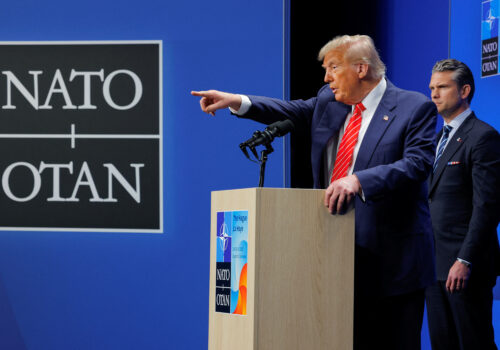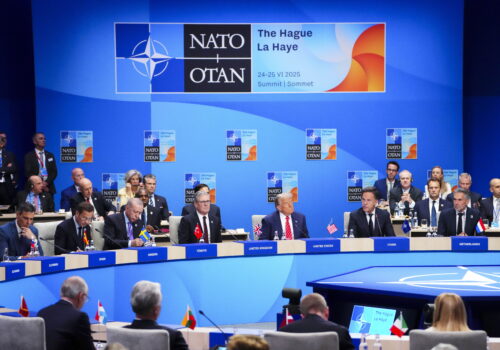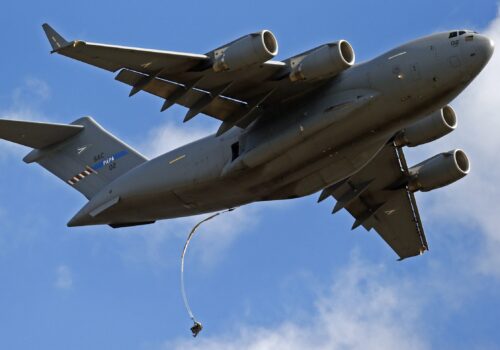NATO has a Mediterranean blind spot—and it puts the Alliance’s security at risk
When NATO leaders and partners of the Alliance met in The Hague last week, countries from two important regions were notably absent: Neither North African nor Middle Eastern nations were at the table when the NATO Summit convened. While this is nothing new, overlooking these regions—especially at a time when Russian threats in North Africa and the Sahel increasingly endanger NATO’s southern neighborhood—is a missed opportunity at best and a critical strategic oversight at worst.
NATO summits are milestone events for the Alliance. Each summit’s communiqué outlines the Alliance’s priorities and signals the policies it expects its member states to adopt. While the focus of the summit is on the allies, it is an increasingly common practice for NATO to invite important non-NATO partners as well. This reflects the “cooperative security” function of the Alliance, reaffirmed in the 2022 Strategic Concept adopted at the Madrid summit.
The power of partners
Inviting partners has not always been the norm. NATO’s declaration at its 1997 Madrid summit marked a turning point by formally recognizing the shared strategic interests of NATO and the European Union, leading to the bloc’s regular participation in NATO Summits. Building on this precedent, the Alliance has expanded its engagement to other strategic partners in recent years: Ukraine, for example, has been consistently invited since Russia’s 2022 full-scale invasion. Australia, Japan, New Zealand, and South Korea are also regular participants.
Meanwhile, the members of NATO’s Mediterranean Dialogue—Algeria, Egypt, Israel, Jordan, Mauritania, Morocco, and Tunisia—have rarely been invited to NATO summits, aside from occasional exceptions. The same holds true for the members of the Istanbul Cooperation Initiative (ICI) that was established in 2004 to complement the Mediterranean Dialogue. The ICI includes Qatar, Bahrain, the United Arab Emirates, and Kuwait. In part, this is because of concerns over some countries’ participation. Algeria and Egypt, for example, have been accused of maintaining close ties with Russia, while varying degrees of friction persist between Morocco and Spain, Algeria and France, and Egypt and Turkey.
Still, the decision to exclude Mediterranean Dialogue and ICI countries this year remains surprising for several reasons. To begin with, at the 2024 NATO Summit in Washington, allies tasked the secretary general with appointing a special representative for the southern neighborhood. In July 2024, Spanish diplomat Javier Colomina was tapped for this role, with a mandate to enhance NATO’s visibility in the Middle East, North Africa, and the Sahel.
Also at the 2024 summit, allies adopted an action plan for the southern neighborhood, drawing on a NATO-commissioned report prepared by an independent expert group in May of that year. The report called for a renewed strategic approach centered on “a strengthening of NATO’s political dialogue about and with the region.” It also called for better integration of the NATO Strategic Direction-South Hub (NSD-S HUB) into the NATO structure. The NSD-S HUB had been created in 2017 to help bridge NATO’s gap with Middle East and North African countries.
These recommendations, however, remain largely unfulfilled. The role of the special representative for the south, which was initially intended to preside over a department, remains a marginal player with little leverage over the rest of the Alliance. The NSD-S HUB remains on the sidelines, lacking power due to its limited mandate and disconnect from NATO headquarters. Meanwhile, NATO cooperation with countries of the Mediterranean Dialogue remains negligible (with the possible exception of Tunisia, which became a major non-NATO ally of the United States in 2015).
The Russia factor
The decision not to invite Mediterranean partners is also striking given Russia’s expanding presence in the so-called wider Mediterranean and its growing role in fueling instability along NATO’s southern flank. Moscow is exploiting the fragility of several states in this area. Russia’s footprint in Mali, Burkina Faso, Niger, and the Central African Republic (CAR)—where it has maintained a strong presence since 2021—has increased. These countries’ regimes (with the exception of the CAR) have progressively dismantled existing security partnerships with France, the European Union, and the United States, which has allowed Russia to consolidate its security ties with these junta-led regimes and further expand its influence. Moscow’s reach into the Sahel is also reinforced by its growing military presence through the Africa Corps, which now operates under the explicit command of the Russian Ministry of Defense. This marks a significant institutional deepening of direct Kremlin control over its paramilitary involvement in the region.
Under former leader Bashar al-Assad, Syria maintained close ties with Russia, even hosting a Russian naval facility at Tartus. But since the Assad regime’s fall in December 2024, Russia has pivoted toward Libya, a country still fractured by internal conflict. Moscow has sought to expand its military presence by deepening its ties with the Haftar family in Libya. With the al-Khadim, al-Jufra, and Maaten al-Sarra airbases, Russia has established several footholds in the country and it is engaged in ongoing negotiations for a new naval base in the port city of Derna. The strategic rationale is clear: Unlike the port of Tartus—which lacks dry-dock facilities for major overhauls—Derna would provide Moscow with a much-needed site for essential naval maintenance, reducing its reliance on distant ports in the Baltic.
Russia’s growing influence in North Africa and the Sahel poses both indirect and direct challenges to NATO’s security. On the indirect front, authoritarian, unaccountable, and externally controlled regimes fuel grievances, which are in turn often exploited by jihadist groups. Moreover, these governments’ reliance on Russia-backed militias for survival leaves them vulnerable to becoming instruments of leverage against NATO members—whether through the manipulation of migration flows toward Europe or by tightening control over critical raw material supply chains.
In terms of direct threats, Russia’s expanding naval presence in the Mediterranean raises concerns about freedom of navigation in the region, as well as the risk of direct incidents between NATO and Russia. The chief of staff of the Italian Navy, Admiral Enrico Credendino, recently stated that “Italian ships operating off the coast of Libya are almost always followed by a Russian spy ship.” Permanent military bases in Libya would grant Moscow new strategic footholds with which to threaten Europe, including with missile systems, while Russia is already recruiting African mercenaries—nicknamed “Black Wagners”—who are currently active in Ukraine and may also be deployed in future crises.
The Mediterranean matters
NATO’s presence in the Mediterranean remains primarily naval, and there is growing concern that this presence is insufficient to provide effective deterrence against Russian expansionism and the threats posed by its proxies. More and more European officials are drawing attention to the fact that Russia’s threat is not limited to NATO’s eastern flank alone. Just a few days before the most recent summit, Italian Defense Minister Guido Crosetto said that NATO “as it is, no longer has a reason to exist,” in part expressing his frustration at the Alliance’s lack of engagement with the Global South. Spanish Prime Minister Pedro Sánchez, too, criticized the Alliance’s priorities during the summit, calling the increased defense spending benchmark of 5 percent of gross domestic product “unreasonable.”
Given these developments, the decision not to invite any of the Mediterranean Dialogue countries to the NATO Summit at The Hague was a missed opportunity. Including at least these partners would have marked an important step in demonstrating to southern European member states that the Alliance’s commitment to a “360 degree vision of security” is not merely rhetorical.
NATO has a strategic opportunity to deepen its engagement with the broader Mediterranean region—especially in light of next year’s summit in Turkey. The Defense and Related Security Capacity Building programs, originally designed to bolster the defense and security capabilities of partner countries, remain underutilized. Expanding cooperation with key states such as Algeria and Egypt through these programs would not only help reinforce NATO’s southern flank but also counter the growing influence of Russia in the region.
Another avenue for impact lies in strengthening cooperative security efforts with Mediterranean partners by reinvigorating existing frameworks, most notably the Mediterranean Dialogue and the ICI. These platforms offer valuable, existing tools for trust-building and joint action.
Finally, NATO should enhance its understanding of the evolving dynamics on its southern flank by expanding the role of the NSD-S HUB in Naples to serve its initial purpose of identifying tangible opportunities for cooperation. All these efforts would meaningfully advance NATO’s goal of a 360-degree approach to security, while also reassuring southern European members that their concerns are being heard and addressed.
Gabriele Natalizia is a visiting fellow with the Atlantic Council’s Europe Center and an associate professor in the Department of Political Science at Sapienza University of Rome.
Alissa Pavia is the associate director of the Atlantic Council’s North Africa program.
Further reading
Thu, Jun 26, 2025
Dispatch from The Hague: It’s been Trump’s week in Europe and Iran
Inflection Points By Frederick Kempe
What connects the recent events in Iran and at the NATO Summit is that they won’t be remembered for the threats countered but rather for the opportunities seized.
Wed, Jun 25, 2025
Experts react: NATO allies agreed to a 5 percent defense spending target in a low-drama summit. Now what?
New Atlanticist By
The Alliance summit was notable for what was said and done, especially about defense spending—but also for what was left off the agenda.
Thu, Jun 5, 2025
Immediate steps that Europe can take to enhance its role in NATO defense
Issue Brief By Franklin D. Kramer, Kristen Taylor
As NATO members gather in the Hague amid uncertainty about US commitment to the continent and concerns about Russia’s military rebuilding, what can European nations do to deter and, if necessary, defeat threats from Moscow?
Image: Logo is seen at the venue of the NATO Summit in The Hague, Netherlands on June 24, 2025. (Photo by Jakub Porzycki/NurPhoto)NO USE FRANCE



